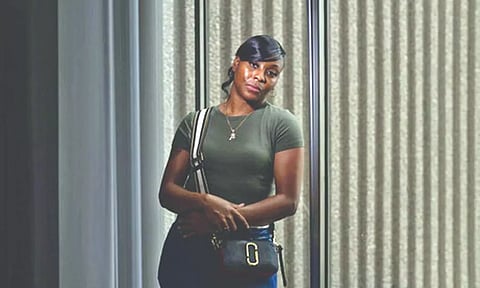

By KASHMIR HILL
NEW YORK: Porcha Woodruff was getting her two daughters ready for school when six police officers showed up at her door in Detroit. They asked her to step outside because she was under arrest for robbery and carjacking.
“Are you kidding?” she recalled saying to the officers.
Woodruff, 32, said she gestured at her stomach to indicate how ill-equipped she was to commit such a crime: She was eight months pregnant. Handcuffed in front of her home on a Thursday morning in February, leaving her crying children with her fiance, Woodruff was taken to the Detroit Detention Center. She said she was held for 11 hours, questioned about a crime she said she had no knowledge of, and had her iPhone seized to be searched for evidence.
“I was having contractions in the holding cell. My back was sending me sharp pains. I was having spasms. I think I was probably having a panic attack,” said Woodruff, a licensed aesthetician and nursing school student. “I was hurting, sitting on those concrete benches.”
After being charged in court with robbery and carjacking, Woodruff was released that evening on a $100,000 personal bond. In an interview, she said she went straight to the hospital where she was diagnosed with dehydration and given two bags of intravenous fluids. A month later, the Wayne County prosecutor dismissed the case against her.
The ordeal started with an automated facial recognition search, according to an investigator’s report from the Detroit Police Department. Woodruff is the sixth person to report being falsely accused of a crime as a result of facial recognition technology used by police to match an unknown offender’s face to a photo in a database. All six people have been Black; Woodruff is the first woman to report it happening to her.
It is the third case involving the Detroit Police Department, which runs, on average, 125 facial recognition searches a year, almost entirely on Black men, according to weekly reports about the technology’s use provided by the police to Detroit’s Board of Police Commissioners, a civilian oversight group. Critics of the technology say the cases expose its weaknesses and the dangers posed to innocent people.
On Thursday, Woodruff filed a lawsuit for wrongful arrest against the city of Detroit in US. District Court for the Eastern District of Michigan. Gary Wells, a psychology professor who has studied the reliability of eyewitness identifications, said pairing facial recognition technology with an eyewitness identification should not be the basis for charging someone with a crime. Even if that similar-looking person is innocent, an eyewitness who is asked to make the same comparison is likely to repeat the mistake made by the computer.
“It is circular and dangerous,” Wells said. “You’ve got a very powerful tool that, if it searches enough faces, will always yield people who look like the person on the surveillance image.” Wells said the technology compounds an existing problem with eyewitnesses. “They assume when you show them a six-pack, the real person is there,” he said.
The city of Detroit faces three lawsuits for wrongful arrests based on the use of the technology. “Shoddy technology makes shoddy investigations, and police assurances that they will conduct serious investigations do not ring true,” said Phil Mayor, a senior staff attorney at the American Civil Liberties Union of Michigan.